ICU Nurse Resume Examples

Jul 18, 2024
|
12 min read
"Master your ICU nurse resume with our simple steps: make your qualifications stand out and secure your dream job in intensive care - it's not just a pipe dream, it's within reach."
Rated by 348 people
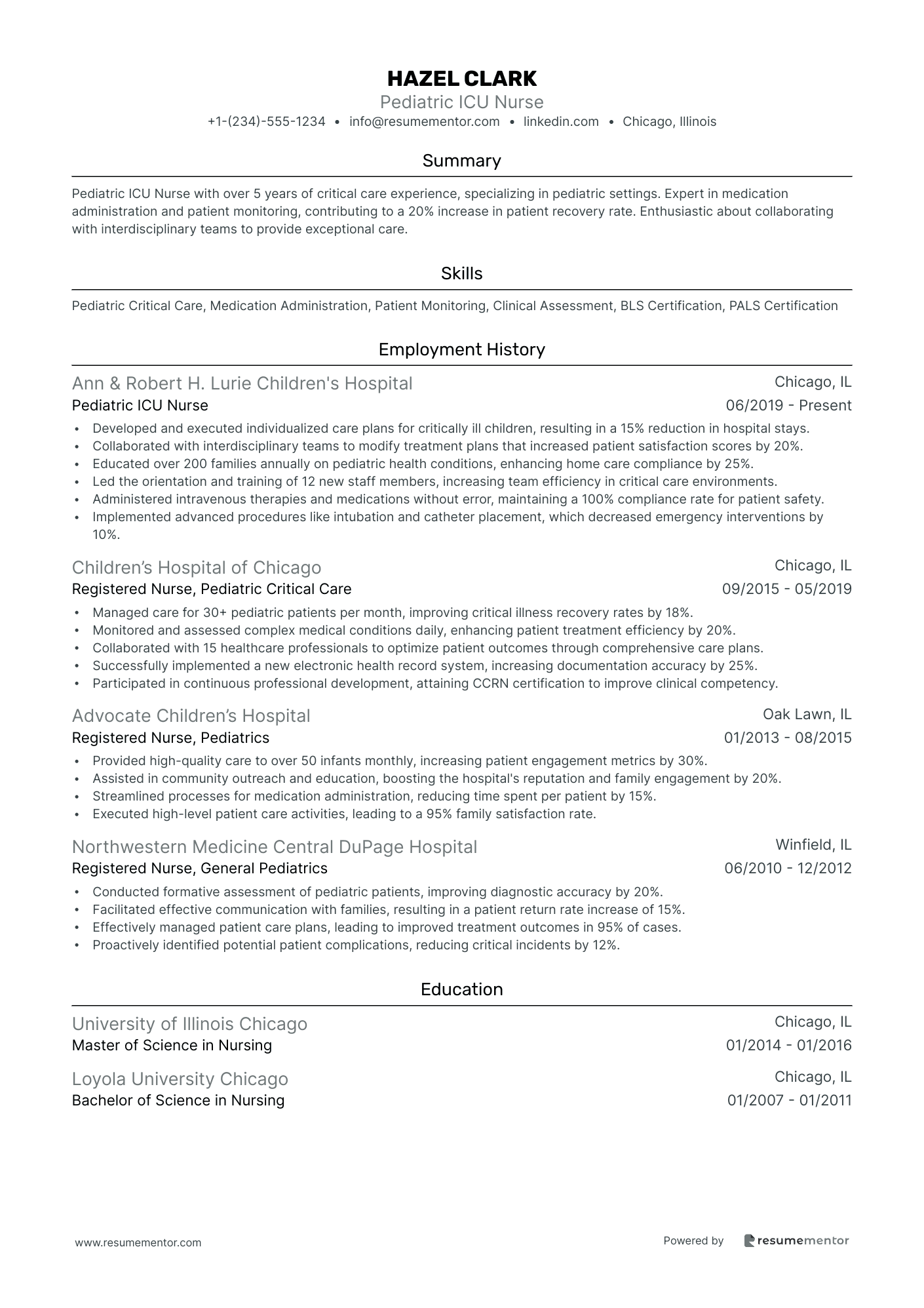
Pediatric ICU Nurse
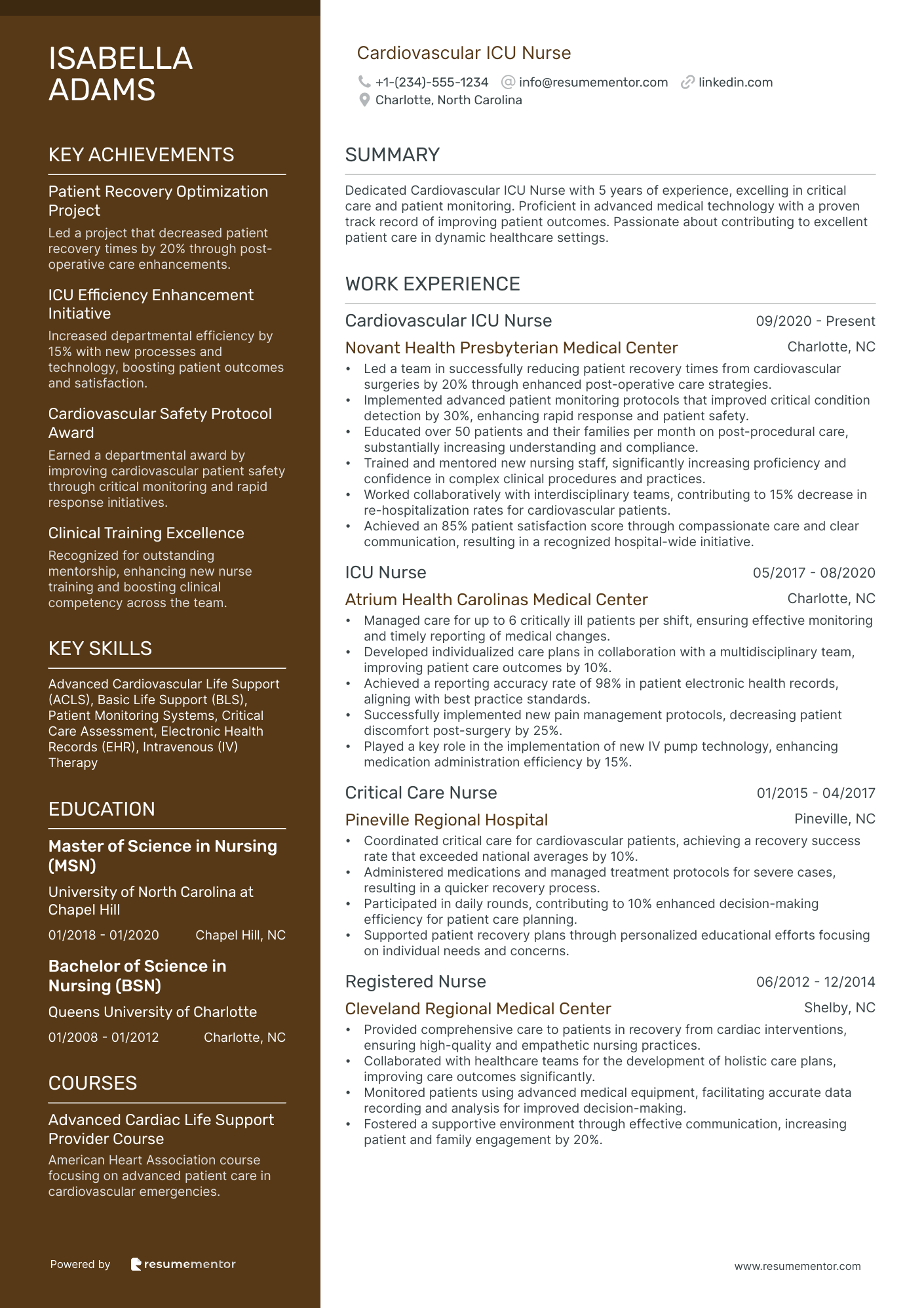
Cardiovascular ICU Nurse
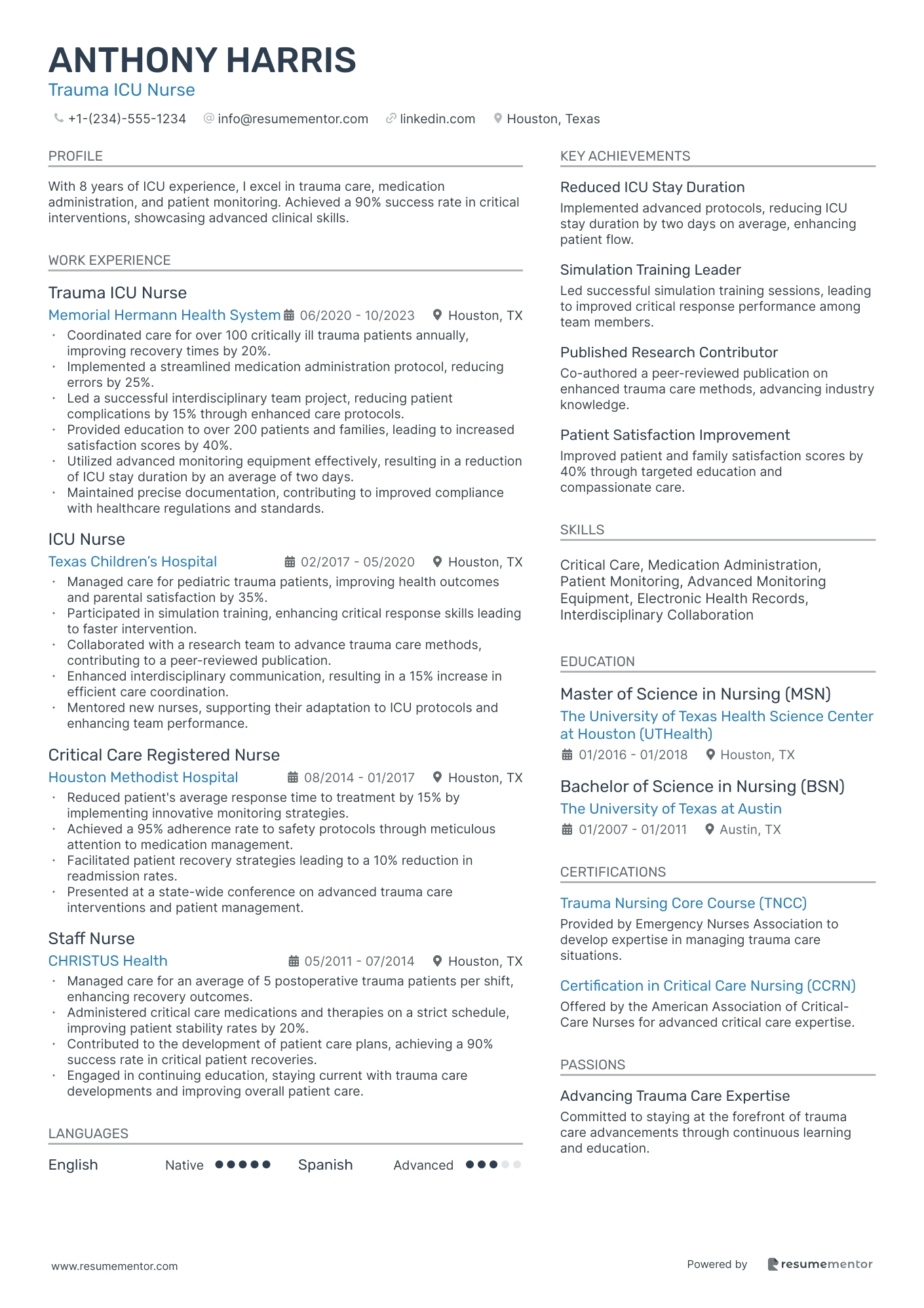
Trauma ICU Nurse
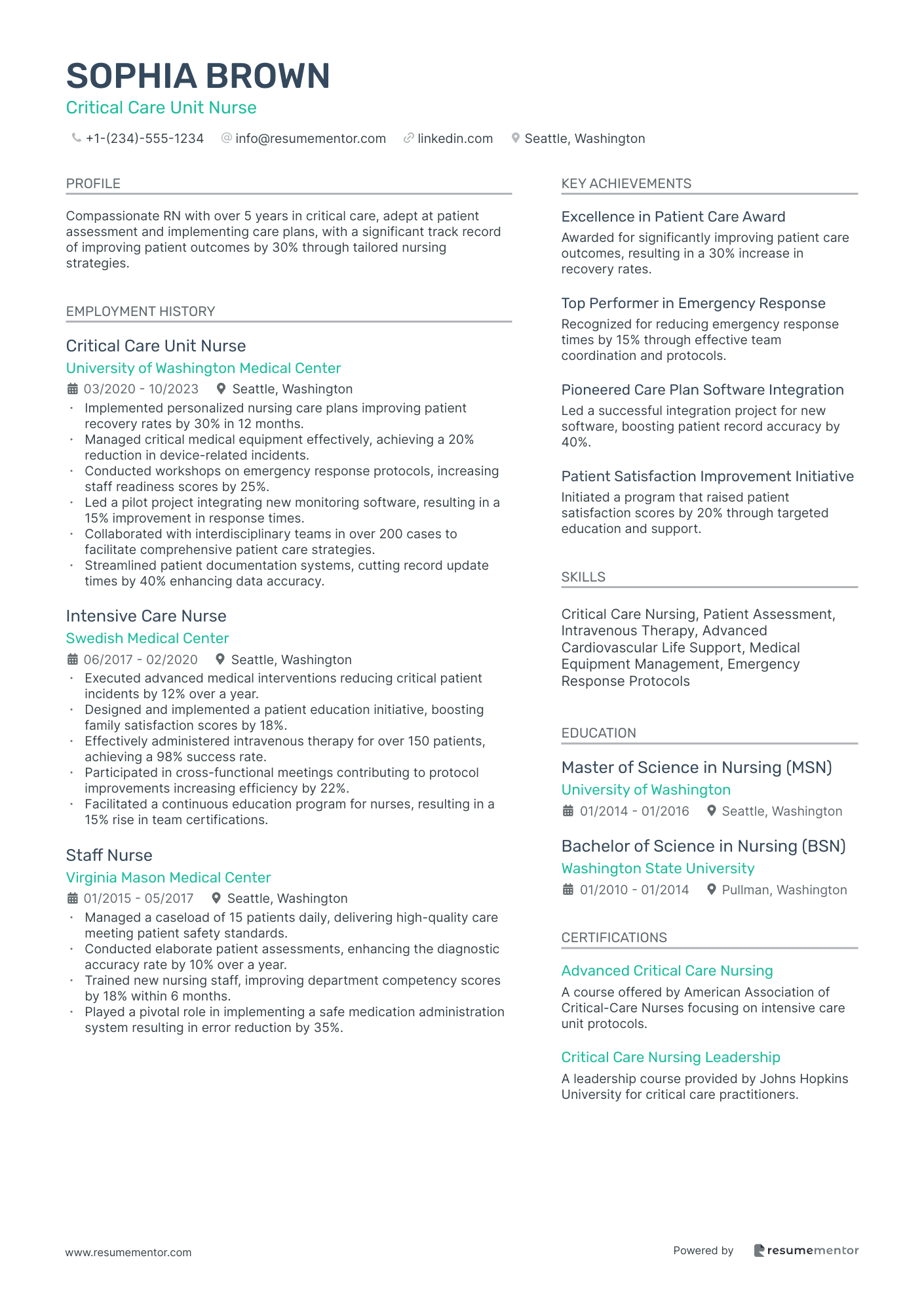
Critical Care Unit Nurse
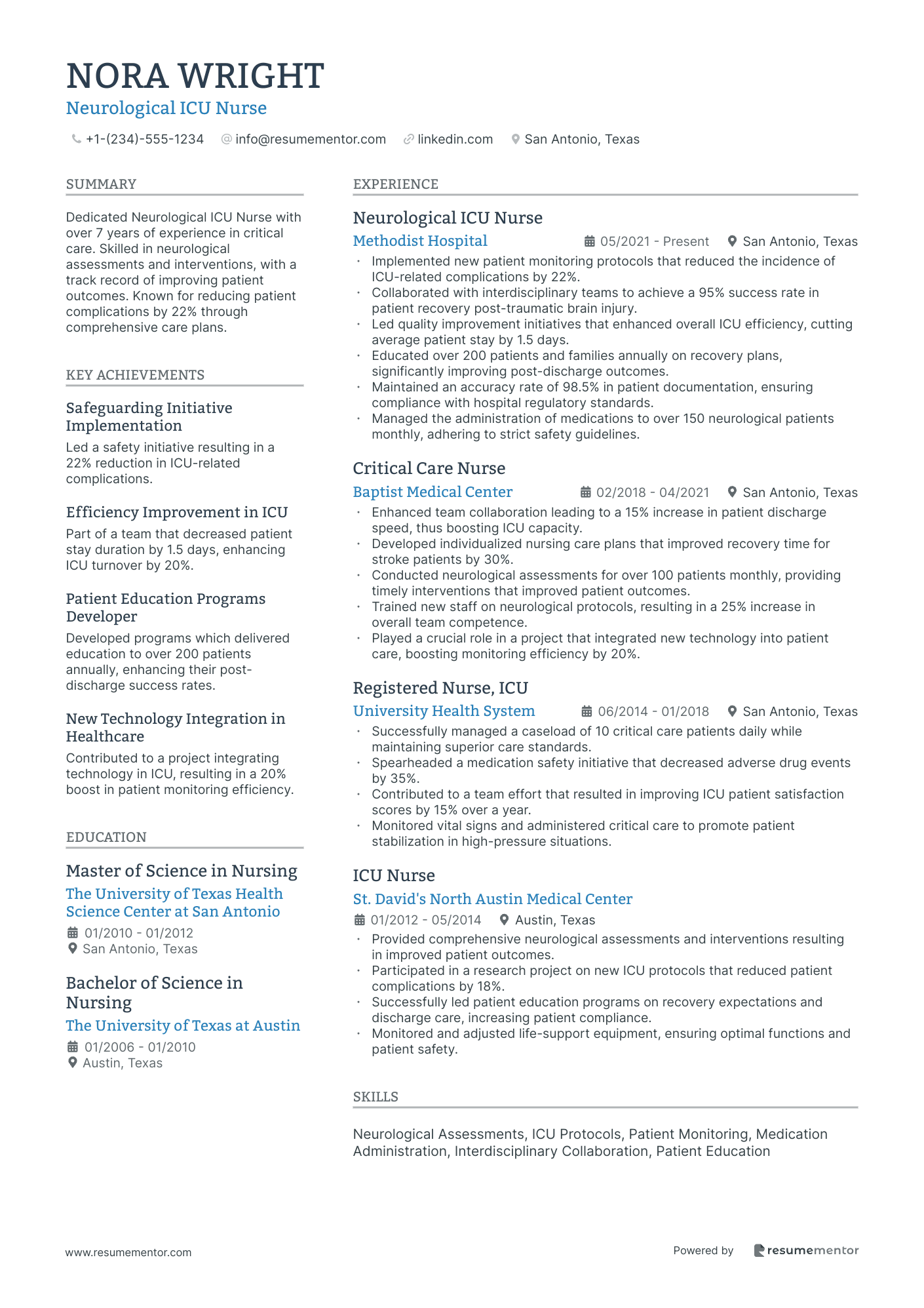
Neurological ICU Nurse
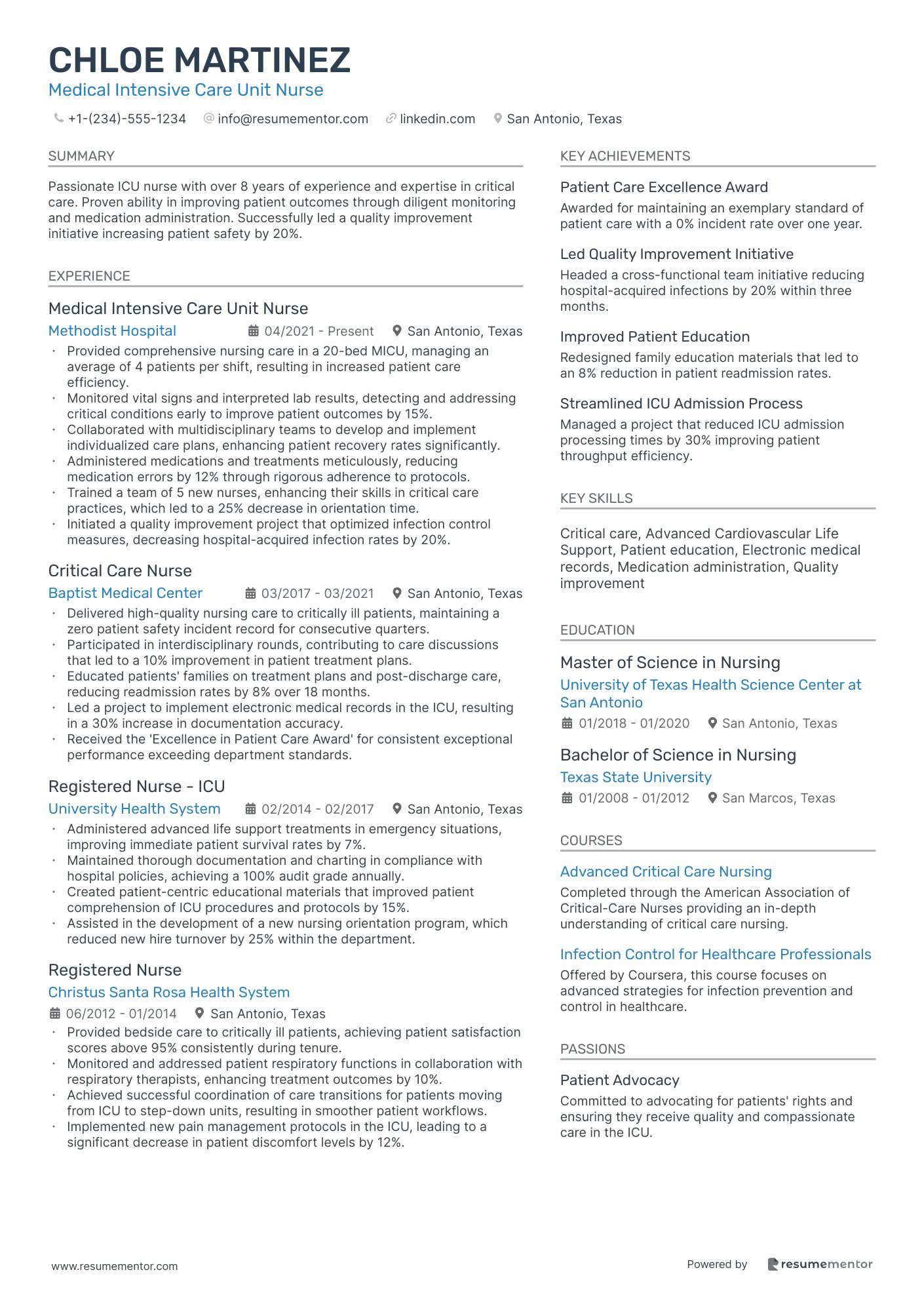
Medical Intensive Care Unit Nurse
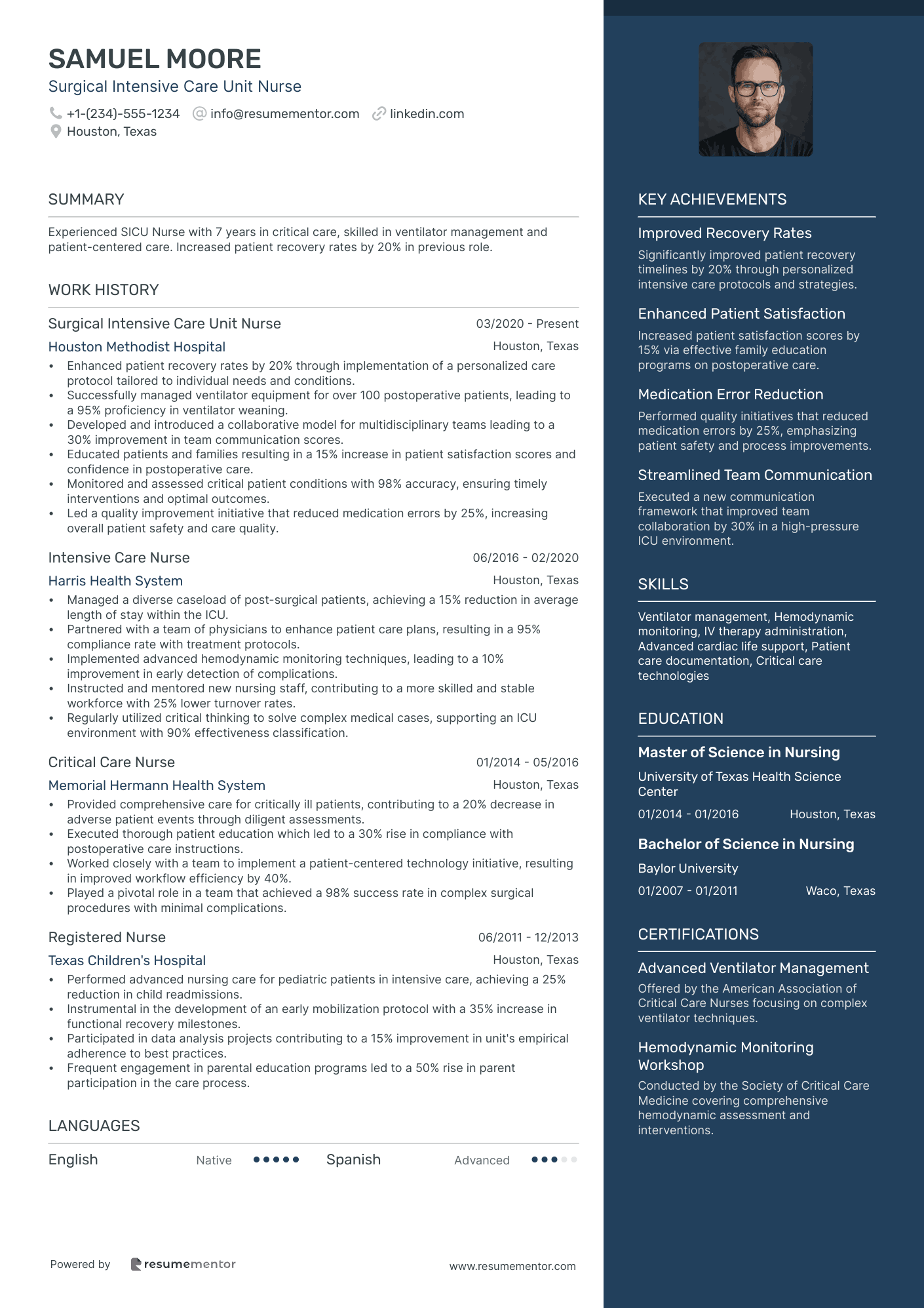
Surgical Intensive Care Unit Nurse
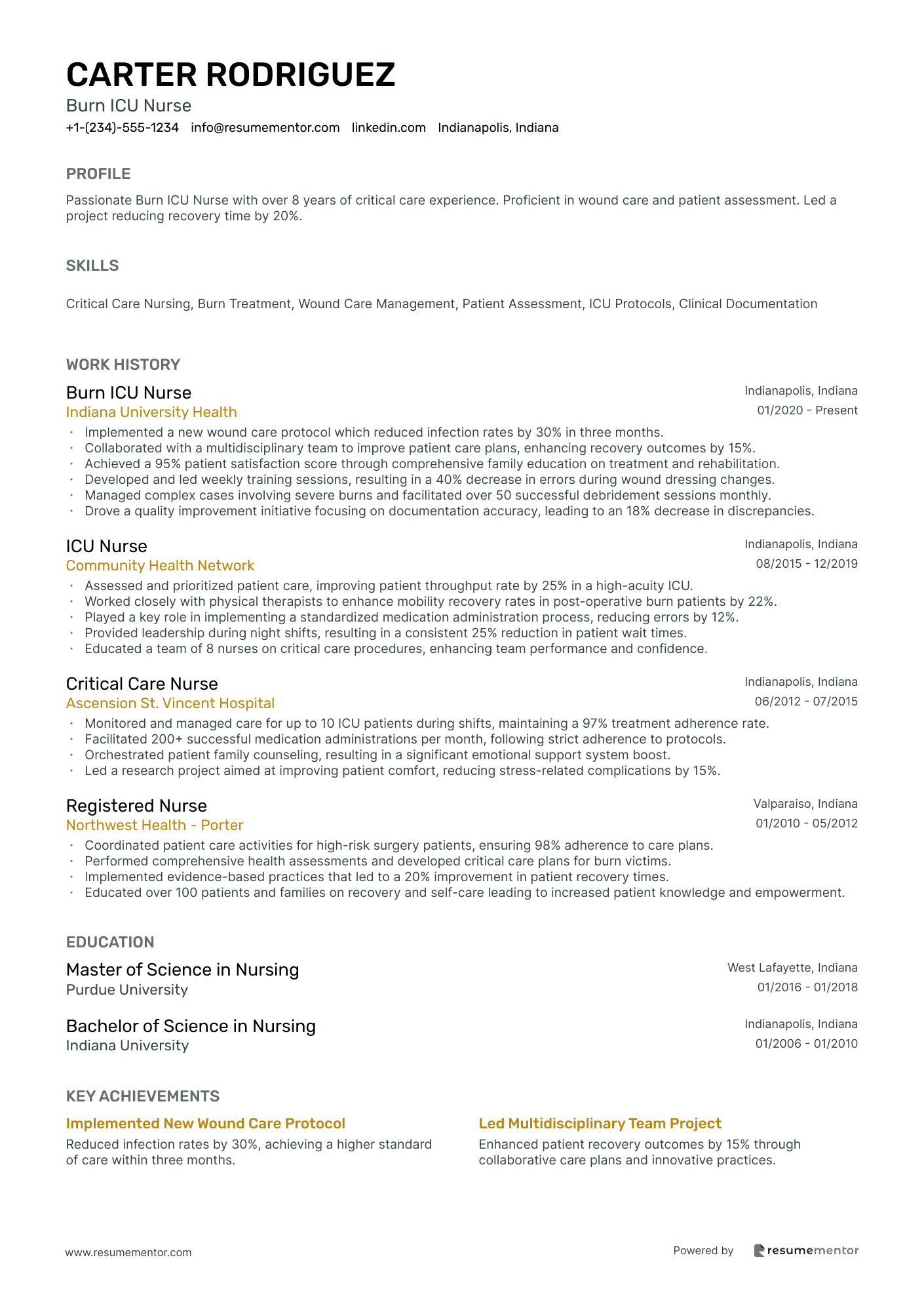
Burn ICU Nurse
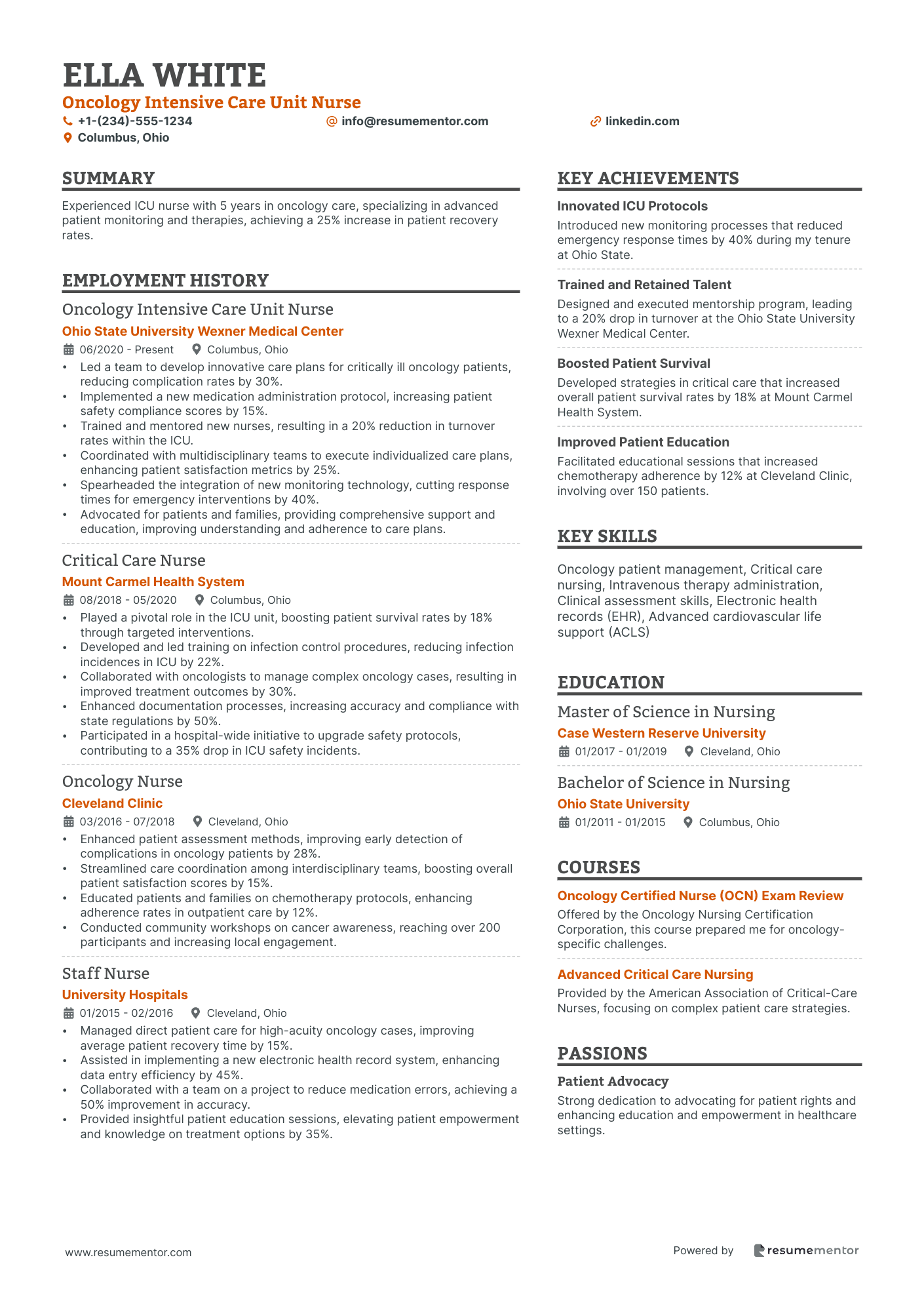
Oncology Intensive Care Unit Nurse

Pediatric ICU Nurse resume sample
- •Developed and executed individualized care plans for critically ill children, resulting in a 15% reduction in hospital stays.
- •Collaborated with interdisciplinary teams to modify treatment plans that increased patient satisfaction scores by 20%.
- •Educated over 200 families annually on pediatric health conditions, enhancing home care compliance by 25%.
- •Led the orientation and training of 12 new staff members, increasing team efficiency in critical care environments.
- •Administered intravenous therapies and medications without error, maintaining a 100% compliance rate for patient safety.
- •Implemented advanced procedures like intubation and catheter placement, which decreased emergency interventions by 10%.
- •Managed care for 30+ pediatric patients per month, improving critical illness recovery rates by 18%.
- •Monitored and assessed complex medical conditions daily, enhancing patient treatment efficiency by 20%.
- •Collaborated with 15 healthcare professionals to optimize patient outcomes through comprehensive care plans.
- •Successfully implemented a new electronic health record system, increasing documentation accuracy by 25%.
- •Participated in continuous professional development, attaining CCRN certification to improve clinical competency.
- •Provided high-quality care to over 50 infants monthly, increasing patient engagement metrics by 30%.
- •Assisted in community outreach and education, boosting the hospital's reputation and family engagement by 20%.
- •Streamlined processes for medication administration, reducing time spent per patient by 15%.
- •Executed high-level patient care activities, leading to a 95% family satisfaction rate.
- •Conducted formative assessment of pediatric patients, improving diagnostic accuracy by 20%.
- •Facilitated effective communication with families, resulting in a patient return rate increase of 15%.
- •Effectively managed patient care plans, leading to improved treatment outcomes in 95% of cases.
- •Proactively identified potential patient complications, reducing critical incidents by 12%.
Cardiovascular ICU Nurse resume sample
- •Led a team in successfully reducing patient recovery times from cardiovascular surgeries by 20% through enhanced post-operative care strategies.
- •Implemented advanced patient monitoring protocols that improved critical condition detection by 30%, enhancing rapid response and patient safety.
- •Educated over 50 patients and their families per month on post-procedural care, substantially increasing understanding and compliance.
- •Trained and mentored new nursing staff, significantly increasing proficiency and confidence in complex clinical procedures and practices.
- •Worked collaboratively with interdisciplinary teams, contributing to 15% decrease in re-hospitalization rates for cardiovascular patients.
- •Achieved an 85% patient satisfaction score through compassionate care and clear communication, resulting in a recognized hospital-wide initiative.
- •Managed care for up to 6 critically ill patients per shift, ensuring effective monitoring and timely reporting of medical changes.
- •Developed individualized care plans in collaboration with a multidisciplinary team, improving patient care outcomes by 10%.
- •Achieved a reporting accuracy rate of 98% in patient electronic health records, aligning with best practice standards.
- •Successfully implemented new pain management protocols, decreasing patient discomfort post-surgery by 25%.
- •Played a key role in the implementation of new IV pump technology, enhancing medication administration efficiency by 15%.
- •Coordinated critical care for cardiovascular patients, achieving a recovery success rate that exceeded national averages by 10%.
- •Administered medications and managed treatment protocols for severe cases, resulting in a quicker recovery process.
- •Participated in daily rounds, contributing to 10% enhanced decision-making efficiency for patient care planning.
- •Supported patient recovery plans through personalized educational efforts focusing on individual needs and concerns.
- •Provided comprehensive care to patients in recovery from cardiac interventions, ensuring high-quality and empathetic nursing practices.
- •Collaborated with healthcare teams for the development of holistic care plans, improving care outcomes significantly.
- •Monitored patients using advanced medical equipment, facilitating accurate data recording and analysis for improved decision-making.
- •Fostered a supportive environment through effective communication, increasing patient and family engagement by 20%.
Trauma ICU Nurse resume sample
- •Coordinated care for over 100 critically ill trauma patients annually, improving recovery times by 20%.
- •Implemented a streamlined medication administration protocol, reducing errors by 25%.
- •Led a successful interdisciplinary team project, reducing patient complications by 15% through enhanced care protocols.
- •Provided education to over 200 patients and families, leading to increased satisfaction scores by 40%.
- •Utilized advanced monitoring equipment effectively, resulting in a reduction of ICU stay duration by an average of two days.
- •Maintained precise documentation, contributing to improved compliance with healthcare regulations and standards.
- •Managed care for pediatric trauma patients, improving health outcomes and parental satisfaction by 35%.
- •Participated in simulation training, enhancing critical response skills leading to faster intervention.
- •Collaborated with a research team to advance trauma care methods, contributing to a peer-reviewed publication.
- •Enhanced interdisciplinary communication, resulting in a 15% increase in efficient care coordination.
- •Mentored new nurses, supporting their adaptation to ICU protocols and enhancing team performance.
- •Reduced patient's average response time to treatment by 15% by implementing innovative monitoring strategies.
- •Achieved a 95% adherence rate to safety protocols through meticulous attention to medication management.
- •Facilitated patient recovery strategies leading to a 10% reduction in readmission rates.
- •Presented at a state-wide conference on advanced trauma care interventions and patient management.
- •Managed care for an average of 5 postoperative trauma patients per shift, enhancing recovery outcomes.
- •Administered critical care medications and therapies on a strict schedule, improving patient stability rates by 20%.
- •Contributed to the development of patient care plans, achieving a 90% success rate in critical patient recoveries.
- •Engaged in continuing education, staying current with trauma care developments and improving overall patient care.
Critical Care Unit Nurse resume sample
- •Implemented personalized nursing care plans improving patient recovery rates by 30% in 12 months.
- •Managed critical medical equipment effectively, achieving a 20% reduction in device-related incidents.
- •Conducted workshops on emergency response protocols, increasing staff readiness scores by 25%.
- •Led a pilot project integrating new monitoring software, resulting in a 15% improvement in response times.
- •Collaborated with interdisciplinary teams in over 200 cases to facilitate comprehensive patient care strategies.
- •Streamlined patient documentation systems, cutting record update times by 40% enhancing data accuracy.
- •Executed advanced medical interventions reducing critical patient incidents by 12% over a year.
- •Designed and implemented a patient education initiative, boosting family satisfaction scores by 18%.
- •Effectively administered intravenous therapy for over 150 patients, achieving a 98% success rate.
- •Participated in cross-functional meetings contributing to protocol improvements increasing efficiency by 22%.
- •Facilitated a continuous education program for nurses, resulting in a 15% rise in team certifications.
- •Managed a caseload of 15 patients daily, delivering high-quality care meeting patient safety standards.
- •Conducted elaborate patient assessments, enhancing the diagnostic accuracy rate by 10% over a year.
- •Trained new nursing staff, improving department competency scores by 18% within 6 months.
- •Played a pivotal role in implementing a safe medication administration system resulting in error reduction by 35%.
- •Provided exceptional bedside nursing care, positively affecting patient discharge satisfaction by 20%.
- •Developed a pain management protocol adopted unit-wide, improving patient comfort scores by 15%.
- •Assisted in the launch of a chronic disease management program reducing hospital readmissions by 10%.
Neurological ICU Nurse resume sample
- •Implemented new patient monitoring protocols that reduced the incidence of ICU-related complications by 22%.
- •Collaborated with interdisciplinary teams to achieve a 95% success rate in patient recovery post-traumatic brain injury.
- •Led quality improvement initiatives that enhanced overall ICU efficiency, cutting average patient stay by 1.5 days.
- •Educated over 200 patients and families annually on recovery plans, significantly improving post-discharge outcomes.
- •Maintained an accuracy rate of 98.5% in patient documentation, ensuring compliance with hospital regulatory standards.
- •Managed the administration of medications to over 150 neurological patients monthly, adhering to strict safety guidelines.
- •Enhanced team collaboration leading to a 15% increase in patient discharge speed, thus boosting ICU capacity.
- •Developed individualized nursing care plans that improved recovery time for stroke patients by 30%.
- •Conducted neurological assessments for over 100 patients monthly, providing timely interventions that improved patient outcomes.
- •Trained new staff on neurological protocols, resulting in a 25% increase in overall team competence.
- •Played a crucial role in a project that integrated new technology into patient care, boosting monitoring efficiency by 20%.
- •Successfully managed a caseload of 10 critical care patients daily while maintaining superior care standards.
- •Spearheaded a medication safety initiative that decreased adverse drug events by 35%.
- •Contributed to a team effort that resulted in improving ICU patient satisfaction scores by 15% over a year.
- •Monitored vital signs and administered critical care to promote patient stabilization in high-pressure situations.
- •Provided comprehensive neurological assessments and interventions resulting in improved patient outcomes.
- •Participated in a research project on new ICU protocols that reduced patient complications by 18%.
- •Successfully led patient education programs on recovery expectations and discharge care, increasing patient compliance.
- •Monitored and adjusted life-support equipment, ensuring optimal functions and patient safety.
Medical Intensive Care Unit Nurse resume sample
- •Provided comprehensive nursing care in a 20-bed MICU, managing an average of 4 patients per shift, resulting in increased patient care efficiency.
- •Monitored vital signs and interpreted lab results, detecting and addressing critical conditions early to improve patient outcomes by 15%.
- •Collaborated with multidisciplinary teams to develop and implement individualized care plans, enhancing patient recovery rates significantly.
- •Administered medications and treatments meticulously, reducing medication errors by 12% through rigorous adherence to protocols.
- •Trained a team of 5 new nurses, enhancing their skills in critical care practices, which led to a 25% decrease in orientation time.
- •Initiated a quality improvement project that optimized infection control measures, decreasing hospital-acquired infection rates by 20%.
- •Delivered high-quality nursing care to critically ill patients, maintaining a zero patient safety incident record for consecutive quarters.
- •Participated in interdisciplinary rounds, contributing to care discussions that led to a 10% improvement in patient treatment plans.
- •Educated patients' families on treatment plans and post-discharge care, reducing readmission rates by 8% over 18 months.
- •Led a project to implement electronic medical records in the ICU, resulting in a 30% increase in documentation accuracy.
- •Received the 'Excellence in Patient Care Award' for consistent exceptional performance exceeding department standards.
- •Administered advanced life support treatments in emergency situations, improving immediate patient survival rates by 7%.
- •Maintained thorough documentation and charting in compliance with hospital policies, achieving a 100% audit grade annually.
- •Created patient-centric educational materials that improved patient comprehension of ICU procedures and protocols by 15%.
- •Assisted in the development of a new nursing orientation program, which reduced new hire turnover by 25% within the department.
- •Provided bedside care to critically ill patients, achieving patient satisfaction scores above 95% consistently during tenure.
- •Monitored and addressed patient respiratory functions in collaboration with respiratory therapists, enhancing treatment outcomes by 10%.
- •Achieved successful coordination of care transitions for patients moving from ICU to step-down units, resulting in smoother patient workflows.
- •Implemented new pain management protocols in the ICU, leading to a significant decrease in patient discomfort levels by 12%.
Surgical Intensive Care Unit Nurse resume sample
- •Enhanced patient recovery rates by 20% through implementation of a personalized care protocol tailored to individual needs and conditions.
- •Successfully managed ventilator equipment for over 100 postoperative patients, leading to a 95% proficiency in ventilator weaning.
- •Developed and introduced a collaborative model for multidisciplinary teams leading to a 30% improvement in team communication scores.
- •Educated patients and families resulting in a 15% increase in patient satisfaction scores and confidence in postoperative care.
- •Monitored and assessed critical patient conditions with 98% accuracy, ensuring timely interventions and optimal outcomes.
- •Led a quality improvement initiative that reduced medication errors by 25%, increasing overall patient safety and care quality.
- •Managed a diverse caseload of post-surgical patients, achieving a 15% reduction in average length of stay within the ICU.
- •Partnered with a team of physicians to enhance patient care plans, resulting in a 95% compliance rate with treatment protocols.
- •Implemented advanced hemodynamic monitoring techniques, leading to a 10% improvement in early detection of complications.
- •Instructed and mentored new nursing staff, contributing to a more skilled and stable workforce with 25% lower turnover rates.
- •Regularly utilized critical thinking to solve complex medical cases, supporting an ICU environment with 90% effectiveness classification.
- •Provided comprehensive care for critically ill patients, contributing to a 20% decrease in adverse patient events through diligent assessments.
- •Executed thorough patient education which led to a 30% rise in compliance with postoperative care instructions.
- •Worked closely with a team to implement a patient-centered technology initiative, resulting in improved workflow efficiency by 40%.
- •Played a pivotal role in a team that achieved a 98% success rate in complex surgical procedures with minimal complications.
- •Performed advanced nursing care for pediatric patients in intensive care, achieving a 25% reduction in child readmissions.
- •Instrumental in the development of an early mobilization protocol with a 35% increase in functional recovery milestones.
- •Participated in data analysis projects contributing to a 15% improvement in unit's empirical adherence to best practices.
- •Frequent engagement in parental education programs led to a 50% rise in parent participation in the care process.
Burn ICU Nurse resume sample
- •Implemented a new wound care protocol which reduced infection rates by 30% in three months.
- •Collaborated with a multidisciplinary team to improve patient care plans, enhancing recovery outcomes by 15%.
- •Achieved a 95% patient satisfaction score through comprehensive family education on treatment and rehabilitation.
- •Developed and led weekly training sessions, resulting in a 40% decrease in errors during wound dressing changes.
- •Managed complex cases involving severe burns and facilitated over 50 successful debridement sessions monthly.
- •Drove a quality improvement initiative focusing on documentation accuracy, leading to an 18% decrease in discrepancies.
- •Assessed and prioritized patient care, improving patient throughput rate by 25% in a high-acuity ICU.
- •Worked closely with physical therapists to enhance mobility recovery rates in post-operative burn patients by 22%.
- •Played a key role in implementing a standardized medication administration process, reducing errors by 12%.
- •Provided leadership during night shifts, resulting in a consistent 25% reduction in patient wait times.
- •Educated a team of 8 nurses on critical care procedures, enhancing team performance and confidence.
- •Monitored and managed care for up to 10 ICU patients during shifts, maintaining a 97% treatment adherence rate.
- •Facilitated 200+ successful medication administrations per month, following strict adherence to protocols.
- •Orchestrated patient family counseling, resulting in a significant emotional support system boost.
- •Led a research project aimed at improving patient comfort, reducing stress-related complications by 15%.
- •Coordinated patient care activities for high-risk surgery patients, ensuring 98% adherence to care plans.
- •Performed comprehensive health assessments and developed critical care plans for burn victims.
- •Implemented evidence-based practices that led to a 20% improvement in patient recovery times.
- •Educated over 100 patients and families on recovery and self-care leading to increased patient knowledge and empowerment.
Oncology Intensive Care Unit Nurse resume sample
- •Led a team to develop innovative care plans for critically ill oncology patients, reducing complication rates by 30%.
- •Implemented a new medication administration protocol, increasing patient safety compliance scores by 15%.
- •Trained and mentored new nurses, resulting in a 20% reduction in turnover rates within the ICU.
- •Coordinated with multidisciplinary teams to execute individualized care plans, enhancing patient satisfaction metrics by 25%.
- •Spearheaded the integration of new monitoring technology, cutting response times for emergency interventions by 40%.
- •Advocated for patients and families, providing comprehensive support and education, improving understanding and adherence to care plans.
- •Played a pivotal role in the ICU unit, boosting patient survival rates by 18% through targeted interventions.
- •Developed and led training on infection control procedures, reducing infection incidences in ICU by 22%.
- •Collaborated with oncologists to manage complex oncology cases, resulting in improved treatment outcomes by 30%.
- •Enhanced documentation processes, increasing accuracy and compliance with state regulations by 50%.
- •Participated in a hospital-wide initiative to upgrade safety protocols, contributing to a 35% drop in ICU safety incidents.
- •Enhanced patient assessment methods, improving early detection of complications in oncology patients by 28%.
- •Streamlined care coordination among interdisciplinary teams, boosting overall patient satisfaction scores by 15%.
- •Educated patients and families on chemotherapy protocols, enhancing adherence rates in outpatient care by 12%.
- •Conducted community workshops on cancer awareness, reaching over 200 participants and increasing local engagement.
- •Managed direct patient care for high-acuity oncology cases, improving average patient recovery time by 15%.
- •Assisted in implementing a new electronic health record system, enhancing data entry efficiency by 45%.
- •Collaborated with a team on a project to reduce medication errors, achieving a 50% improvement in accuracy.
- •Provided insightful patient education sessions, elevating patient empowerment and knowledge on treatment options by 35%.
Writing an ICU nurse resume can be as critical as performing a life-saving procedure in the Intensive Care Unit. Many ICU nurses find themselves overwhelmed, facing the unique challenge of translating complex medical skills and experiences into an easily digestible resume format. Crafting a clear, impactful resume while juggling long shifts and emotionally demanding work can feel impossible. Furthermore, given the highly specialized nature of ICU nursing, it's vital to highlight specific skills and certifications that set you apart. This guide aims to demystify the resume-writing process, helping you create a compelling snapshot of your professional journey, without the stress.
To make sure your resume stands out, choosing the right template is crucial. A well-structured resume template can spotlight your strengths, making it easier for hiring managers to pick up your unique qualifications. It provides an organized framework, ensuring you don’t miss any critical details that can help you land that dream job.
Unlock your career potential today! With over 700 resume examples, you've got plenty of inspiration to craft your perfect resume.
Key Takeaways
- Choosing the right template is crucial to make your resume stand out and highlight your qualifications effectively.
- An ICU nurse resume should showcase specialized skills, experience in critical care, and ability to handle high-stress environments.
- Key sections for an ICU nurse resume include Contact Information, Professional Summary, Skills, Professional Experience, Education, and Certifications.
- The reverse-chronological format is recommended for ICU nurse resumes as it clearly highlights work experience.
- Adding sections like Continuing Education and Professional Affiliations can further showcase dedication and expertise in the ICU nursing field.
What to focus on when writing your ICU nurse resume
An ICU nurse resume should showcase your specialized skills, experience in critical care, and ability to handle high-stress environments. Highlight your proficiency with advanced medical equipment, your exceptional patient care, and your commitment to following medical protocols. Demonstrate your communication skills and teamwork abilities, as patient care in ICU settings often requires collaboration. To further boost your resume's impact, consider including the following:
- Certification and licensing details
- Demonstrative examples of critical patient cases handled
- Quantifiable achievements, such as improvements in patient outcome metrics
- Advanced training or participation in relevant workshops or seminars
Each element can help solidify your qualifications and demonstrate your readiness for the demanding ICU environment.
Must have information on your ICU nurse resume
Creating a standout ICU nurse resume requires including key sections that highlight your skills, experience, and qualifications. Here are the must-have sections for an ICU nurse resume:
- Contact Information
- Professional Summary
- Skills
- Professional Experience
- Education
- Certifications
Additionally, sections such as Continuing Education and Professional Affiliations can further showcase your dedication and expertise in the field. These sections will help make your resume complete and well-rounded.
Which resume format to choose
For an ICU nurse resume, the best format is the reverse-chronological format because it highlights your work experience clearly and effectively. Use modern fonts like Rubik and Montserrat instead of the dated Arial and Times New Roman to give your resume a fresh look. Always save your resume as a PDF to avoid formatting issues and ensure the document looks the same on any device. Stick to 1-inch margins on all sides to keep your resume clean and readable. Use clear section headings to structure your resume; this helps both the reader and the Applicant Tracking System (ATS) understand your qualifications quickly.
An ICU nurse resume should have these sections:
- Contact Information
- Professional Summary
- Skills
- Professional Experience
- Education
- Certifications
- Licenses
- Volunteer Experience (if applicable)
Resume Mentor's free resume builder handles all of this for you, making the process simple and easy.
How to write a quantifiable resume experience section
Writing the experience section of your ICU nurse resume can feel overwhelming, but by focusing on clear, simple language, you can effectively showcase your skills and achievements. Let's break it down step-by-step.
When it comes to the order of your resume, list your most recent job first. This reverse-chronological order helps recruiters see your most current experience upfront. Generally, go back about 10-15 years, but if you have relevant older experience, it’s okay to include it.
Include job titles that reflect your experience in nursing, especially if they highlight skills relevant to the ICU. Specificity is key. Tailor your resume to match the job description of the position you’re applying for. If the job posting mentions certain skills or tasks, make sure to include those matching aspects in your experience.
Using action words is crucial. Instead of passive descriptions, use verbs like "managed," "implemented," "led," "achieved," etc., to highlight your responsibilities and accomplishments. Numbers and specific achievements can make your experience stand out more than a list of duties. For example, "Cared for 15 patients daily" is stronger than "Responsible for patient care."
Let's look at two examples for an ICU nurse resume experience section. The first one will be poorly written, and then we'll follow it up with a well-written one.
- •Responsible for patient care
- •Administered medications
- •Monitored patients
This example is bad because it lacks specifics and achievements. It uses generic words like "responsible for" and "monitored," which don’t provide any real sense of your skills and impact. It doesn't tell the recruiter anything about the quality or scale of your work.
Now, here’s an example of a well-written ICU nurse resume experience section:
- •Provided critical care to over 20 patients daily, improving patient recovery rates by 15%
- •Implemented a new patient monitoring system, reducing response time by 30%
- •Led a team of 10 nurses, achieving a 95% satisfaction rate in patient care
This second example stands out because of its use of numbers and specific achievements. It highlights what you accomplished in the role, giving a clear picture of your effectiveness and skills. Recruiters looking at this resume can immediately see the impact you've had in your previous positions, making you a more attractive candidate.
Follow these guidelines, and your experience section will reflect your best achievements and skills, making you stand out in the job market.
ICU nurse resume experience examples
Welcome to the ICU Nurse resume section—get ready to take your career to critical heights! Ready to inject some life into your job application? It's a sure way to resuscitate your resume!
Achievement-focused
Highlighting achievements showcases your success in the field. Consider including awards, milestones, and recognitions.
ICU Nurse
Mercy Hospital
June 2018 - Present
- Awarded 'Employee of the Month' twice for exceptional patient care
- Implemented a new patient monitoring system that reduced adverse events by 15%
- Successfully handled a caseload of up to 10 critically ill patients daily
Skills-focused
Focus on key competencies that make you an excellent ICU nurse. Use specific skills relevant to the job.
ICU Nurse
General Health Services
January 2015 - May 2018
- Proficient in Advanced Cardiac Life Support (ACLS)
- Expert in operating and interpreting intra-aortic balloon pump
- Adept at multi-tasking in high-pressure environments
Responsibility-focused
Detail your responsibilities to give potential employers a clear picture of your day-to-day duties.
ICU Nurse
St. Mary’s Medical Center
March 2013 - December 2014
- Administered medication and monitored patient’s vitals
- Coordinated with multidisciplinary team for comprehensive care plans
- Provided emotional support to patients and their families
Project-focused
Detail specific projects you’ve led or participated in that are relevant to ICU nursing.
ICU Nurse
Community Health Hospital
October 2020 - July 2021
- Led the implementation of a new electronic health record system
- Developed a family communication protocol during COVID-19
- Organized a peer training program for new hires
Result-focused
Showcase the impact of your work by highlighting measurable results.
ICU Nurse
City Hospital
August 2017 - September 2020
- Reduced patient recovery time by 20% through optimized care routines
- Increased patient satisfaction scores by 25%
- Decreased medication errors by 30% through vigilant monitoring
Industry-Specific Focus
Highlight your experience within the healthcare industry, particularly in ICU settings.
ICU Nurse
Regional Medical Center
April 2016 - July 2017
- Specialized in post-operative care for cardiac surgery patients
- Expertise in handling ventilated patients and tracheostomies
- Experience with various ICU monitoring systems
Problem-Solving focused
Outline your problem-solving skills and how you addressed specific challenges in the ICU.
ICU Nurse
Healthcare Solutions Hospital
February 2012 - March 2016
- Successfully resolved critical equipment failure to ensure patient safety
- Implemented new protocols to reduce infection rates
- Developed a rapid response plan for deteriorating patients
Innovation-focused
Show how your innovative ideas have made an impact in the ICU environment.
ICU Nurse
Advanced Care Hospital
June 2019 - December 2021
- Designed a customized EHR template to streamline documentation
- Introduced a color-coded system for quicker emergency response
- Pioneered a virtual ICU follow-up program for discharged patients
Leadership-focused
Describe your leadership roles and responsibilities in the ICU.
Lead ICU Nurse
University Medical Center
January 2014 - May 2019
- Supervised a team of 15 ICU nurses during shifts
- Conducted monthly performance reviews and provided feedback
- Led daily huddles to discuss patient care plans and updates
Customer-focused
Show how you put patient care and satisfaction at the forefront of your work.
ICU Nurse
Good Health Hospital
July 2015 - November 2020
- Maintained open communication with patients and their families
- Developed and executed personalized care plans
- Achieved a 98% patient satisfaction rate
Growth-focused
Illustrate your professional growth and how you have advanced in your ICU nursing career.
Senior ICU Nurse
Pioneer Health System
August 2011 - Present
- Progressed from junior to senior ICU nurse within 4 years
- Obtained certification in critical care nursing (CCRN)
- Mentored 10 nursing students and new hires annually
Efficiency-focused
Detail how you have worked to improve efficiency in the ICU.
ICU Nurse
Metro Health Care
March 2013 - August 2016
- Streamlined shift handover process, saving 30 minutes per handover
- Optimized supply chain management to ensure constant availability of critical supplies
- Implemented electronic medical records, reducing paperwork by 40%
Technology-focused
Emphasize your expertise with medical technologies and equipment in the ICU.
ICU Nurse
Tech & Health Hospital
April 2014 - June 2020
- Proficient in operating mechanical ventilators and infusion pumps
- Experienced in utilizing EMR systems for patient documentation
- Familiar with telemedicine platforms for remote patient monitoring
Collaboration-focused
Detail your ability to work effectively with other healthcare professionals.
ICU Nurse
National Health Institute
September 2016 - January 2021
- Collaborated with doctors and specialists for comprehensive patient care
- Participated in interdisciplinary rounds to discuss patient progress
- Fostered a team-oriented environment through effective communication
Training and Development focused
Showcase your role in training and developing other nurses.
ICU Nurse Educator
Healthcare Learning Center
May 2017 - Present
- Conducted orientation sessions for new ICU nurses
- Developed ongoing training programs to enhance skills
- Evaluated and provided feedback on clinical practices
Write your ICU nurse resume summary section
Writing a resume summary for your ICU nurse application doesn’t have to be a daunting task. A resume summary is a brief statement that captures your professional skills, experience, and achievements. It should immediately grab the recruiter's attention and make them want to read more.
When writing a resume summary, aim to clearly describe who you are and what you bring to the table. Use action verbs and specific job-related skills. Be concise yet informative. For an ICU nurse, include qualifications, years of experience, any specialties, and notable accomplishments.
Resume summaries are different from objectives in that a summary focuses on what you have achieved and can offer a potential employer, while an objective is centered on your professional goals. A resume profile can be similar to a summary but is typically longer and more detailed. A summary of qualifications is a bullet-point list of your top skills and experiences.
Here is an example of a poorly written ICU nurse resume summary:
This resume summary is vague and lacks specific details. It does not highlight specialized skills or mention any notable achievements. Phrases like "many years of experience" and "good patient care skills" are too generic. Employers won't get a clear sense of your competencies or what sets you apart from other candidates.
Here’s an example of an excellent ICU nurse resume summary:
This resume summary is effective because it’s specific and detailed. It highlights over 10 years of experience and mentions key skills such as ventilator management and advanced cardiac life support. It also touches on proficiency with EHR and strong patient communication, providing a well-rounded view of the candidate's capabilities.
By focusing on specifics and showcasing your unique strengths, you can craft a captivating resume summary that stands out to prospective employers.
Listing your ICU nurse skills on your resume
Writing a great skills section for your ICU nurse resume involves focusing on both hard and soft skills that highlight your experience and strengths. Skills can be listed as a standalone section and also woven into other areas like your experience and summary to create a cohesive story about your qualifications.
Strengths and soft skills, such as communication and teamwork, are essential aspects of being an effective ICU nurse. Hard skills, which are specific technical abilities acquired through training and practice, are equally crucial. These include expertise in patient monitoring and IV administration.
When you incorporate skills and strengths into your resume, they also serve as keywords that help your resume stand out to hiring managers and automated applicant tracking systems. Placing these keywords strategically throughout your resume enhances visibility and demonstrates your qualifications effectively.
This skills section is good because it is concise and highlights the most critical competencies for an ICU nurse. Including these eight relevant skills shows a comprehensive understanding of the job's demands. It captures both technical abilities and essential nursing practices, making it clear and easy for hiring managers to see your qualifications at a glance.
Best hard skills to feature on your icu nurse resume
As an ICU nurse, your resume should highlight hard skills that demonstrate your expertise in patient care and technical nursing practices. These skills should communicate your ability to handle critical care situations and your proficiency with medical equipment and procedures.
Hard Skills
- Ventilator Management
- Critical Care Expertise
- EKG Interpretation
- IV Administration
- Hemodynamic Monitoring
- Patient Assessment
- Medication Administration
- Advanced Life Support
- CPR and First Aid
- Blood Transfusion
- Wound Care
- Patient Charting
- Invasive Line Care
- Dialysis Management
- Emergency Response
Best soft skills to feature on your icu nurse resume
Soft skills are critical for ICU nurses as they communicate your ability to work well under stress, collaborate with healthcare teams, and provide compassionate patient care. These skills are indicative of your interpersonal abilities and your capability to adapt in fast-paced environments.
Soft Skills
- Communication
- Teamwork
- Problem-solving
- Compassion
- Time Management
- Stress Management
- Adaptability
- Patient Advocacy
- Attention to Detail
- Emotional Resilience
- Conflict Resolution
- Leadership
- Multi-tasking
- Empathy
- Decision-Making
How to include your education on your resume
An education section is an important part of your ICU nurse resume. You should tailor this section to the job you're applying for. Irrelevant education should not be included to keep the section clear and focused. When listing your degree, include the degree title, institution name, location, and dates of study. Mention your GPA if it’s above 3.5 to highlight your academic performance, and note any "cum laude" honors if applicable. This shows employers your dedication and success in your studies.
Here's an example of a poorly written education section:
This example is bad because it lists irrelevant education for an ICU nurse position and doesn't highlight the nursing qualifications. The GPA and any honors are also missing.
Here’s an excellent education section example:
This example is good because it lists an appropriate degree for an ICU nurse, includes a strong GPA, and is concise yet informative. This ensures employers see your relevant qualifications right away.
How to include ICU nurse certificates on your resume
Including a certificates section in your ICU nurse resume is essential to showcase your specialized skills and qualifications. This section highlights your dedication to continuing education and professional growth. You can list the name of the certificate, the date you obtained it, and the issuing organization. It is equally effective to place this information near the header of your resume for immediate visibility.
To include certificates, list the name of each certification. Include the date you earned each one. Add the name of the issuing organization for credibility. Displaying these details clearly ensures potential employers see your qualifications upfront.
Here is an example in JSON format:
This example is excellent because it includes certifications relevant to ICU nursing. Each certification is clearly listed with its issuing body, ensuring clarity and professionalism. These certifications reflect a high level of expertise and are directly applicable to your role as an ICU nurse.
Extra sections to include in your ICU nurse resume
In the dynamic and often challenging environment of an Intensive Care Unit (ICU), experienced nurses play a critical role in providing high-quality care and ensuring patient safety. Crafting a well-rounded resume can significantly impact how you present your skills, experiences, and qualifications to potential employers. Knowing how to incorporate various sections into your resume effectively provides a fuller picture of your capabilities and interests, setting you apart in a competitive field.
- Language section — List languages you speak to showcase your multilingual skills. This can be a key asset in delivering patient care to diverse populations.
- Hobbies and interests section — Share your hobbies and interests to provide a sense of your personality and work-life balance. This can make you more relatable to hiring managers.
- Volunteer work section — Describe your volunteer work to demonstrate your community involvement and commitment to helping others. This can highlight your ability to manage time and handle additional responsibilities.
- Books section — Mention influential books you've read to indicate your dedication to continuous learning and professional growth. This can reveal your curiosity and drive to stay informed in your field.
Pair your ICU nurse resume with a cover letter
A cover letter is a document you send with your resume when applying for a job. It allows you to introduce yourself, highlight your key skills, and explain why you're a good fit for the role. A well-crafted cover letter can help grab the attention of hiring managers and make you stand out from other applicants.
For an ICU nurse, your cover letter should focus on your experience in intensive care, your ability to handle high-stress situations, and your knowledge of advanced medical equipment. Mention any specific certifications or training that make you especially qualified. Highlight your commitment to patient care and teamwork, as these are crucial in an ICU setting.
Create your cover letter with Resume Mentor's easy-to-use cover letter builder today. Exporting as a PDF helps protect the content and formatting, ensuring your letter looks professional when opened by potential employers.
Christian Torres
San Antonio, Texas
+1-(234)-555-1234
help@resumementor.com
Related Articles

Continue Reading
Check more recommended readings to get the job of your dreams.
Resume
Resources
Tools
© 2026. All rights reserved.
Made with love by people who care.

